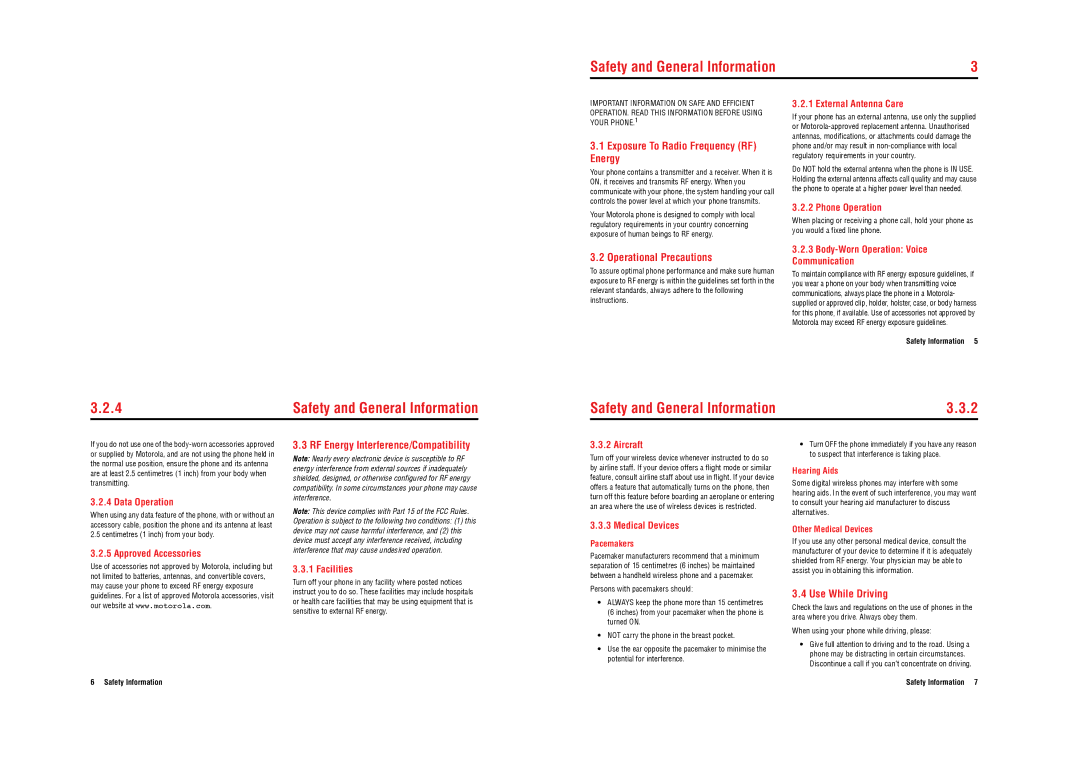Safety and General Information | 3 |
IMPORTANT INFORMATION ON SAFE AND EFFICIENT OPERATION. READ THIS INFORMATION BEFORE USING YOUR PHONE.1
3.1Exposure To Radio Frequency (RF) Energy
Your phone contains a transmitter and a receiver. When it is ON, it receives and transmits RF energy. When you communicate with your phone, the system handling your call controls the power level at which your phone transmits.
Your Motorola phone is designed to comply with local regulatory requirements in your country concerning exposure of human beings to RF energy.
3.2.1 External Antenna Care
If your phone has an external antenna, use only the supplied or
Do NOT hold the external antenna when the phone is IN USE. Holding the external antenna affects call quality and may cause the phone to operate at a higher power level than needed.
3.2.2 Phone Operation
When placing or receiving a phone call, hold your phone as you would a fixed line phone.
3.2 Operational Precautions
To assure optimal phone performance and make sure human exposure to RF energy is within the guidelines set forth in the relevant standards, always adhere to the following instructions.
3.2.3Body-Worn Operation: Voice Communication
To maintain compliance with RF energy exposure guidelines, if you wear a phone on your body when transmitting voice communications, always place the phone in a Motorola- supplied or approved clip, holder, holster, case, or body harness for this phone, if available. Use of accessories not approved by Motorola may exceed RF energy exposure guidelines.
3.2.4 | Safety and General Information |
Safety Information 5
Safety and General Information | 3.3.2 |
If you do not use one of the
3.2.4 Data Operation
When using any data feature of the phone, with or without an
3.3 RF Energy Interference/Compatibility
Note: Nearly every electronic device is susceptible to RF energy interference from external sources if inadequately shielded, designed, or otherwise configured for RF energy compatibility. In some circumstances your phone may cause interference.
Note: This device complies with Part 15 of the FCC Rules.
3.3.2 Aircraft
Turn off your wireless device whenever instructed to do so by airline staff. If your device offers a flight mode or similar feature, consult airline staff about use in flight. If your device offers a feature that automatically turns on the phone, then turn off this feature before boarding an aeroplane or entering an area where the use of wireless devices is restricted.
•Turn OFF the phone immediately if you have any reason to suspect that interference is taking place.
Hearing Aids
Some digital wireless phones may interfere with some hearing aids. In the event of such interference, you may want to consult your hearing aid manufacturer to discuss alternatives.
accessory cable, position the phone and its antenna at least 2.5 centimetres (1 inch) from your body.
3.2.5 Approved Accessories
Use of accessories not approved by Motorola, including but not limited to batteries, antennas, and convertible covers, may cause your phone to exceed RF energy exposure guidelines. For a list of approved Motorola accessories, visit our website at www.motorola.com.
Operation is subject to the following two conditions: (1) this device may not cause harmful interference, and (2) this device must accept any interference received, including interference that may cause undesired operation.
3.3.1 Facilities
Turn off your phone in any facility where posted notices instruct you to do so. These facilities may include hospitals or health care facilities that may be using equipment that is sensitive to external RF energy.
3.3.3 Medical Devices
Pacemakers
Pacemaker manufacturers recommend that a minimum separation of 15 centimetres (6 inches) be maintained between a handheld wireless phone and a pacemaker.
Persons with pacemakers should:
•ALWAYS keep the phone more than 15 centimetres (6 inches) from your pacemaker when the phone is turned ON.
•NOT carry the phone in the breast pocket.
•Use the ear opposite the pacemaker to minimise the potential for interference.
Other Medical Devices
If you use any other personal medical device, consult the manufacturer of your device to determine if it is adequately shielded from RF energy. Your physician may be able to assist you in obtaining this information.
3.4 Use While Driving
Check the laws and regulations on the use of phones in the area where you drive. Always obey them.
When using your phone while driving, please:
•Give full attention to driving and to the road. Using a phone may be distracting in certain circumstances. Discontinue a call if you can’t concentrate on driving.
6 Safety Information
Safety Information 7
